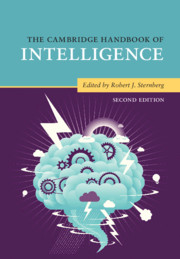Book contents
- The Cambridge Handbook of Intelligence
- The Cambridge Handbook of Intelligence
- Copyright page
- Dedication
- Contents
- Figures
- Tables
- Contributors
- Preface
- Part I Intelligence and Its Measurement
- Part II Development of Intelligence
- Part III Intelligence and Group Differences
- Part IV Biology of Intelligence
- Part V Intelligence and Information Processing
- Part VI Kinds of Intelligence
- Part VII Intelligence and Its Role in Society
- Part VIII Intelligence and Allied Constructs
- 42 Intelligence and Personality
- 43 Intelligence and Achievement
- 44 Intelligence and Motivation
- 45 Intelligence and Creativity
- 46 Intelligence and Rationality
- 47 Intelligence and Wisdom
- 48 Intelligence and Expertise
- Part IX Folk Conceptions of Intelligence
- Part X Conclusion
- Author Index
- Subject Index
- References
48 - Intelligence and Expertise
from Part VIII - Intelligence and Allied Constructs
Published online by Cambridge University Press: 13 December 2019
- The Cambridge Handbook of Intelligence
- The Cambridge Handbook of Intelligence
- Copyright page
- Dedication
- Contents
- Figures
- Tables
- Contributors
- Preface
- Part I Intelligence and Its Measurement
- Part II Development of Intelligence
- Part III Intelligence and Group Differences
- Part IV Biology of Intelligence
- Part V Intelligence and Information Processing
- Part VI Kinds of Intelligence
- Part VII Intelligence and Its Role in Society
- Part VIII Intelligence and Allied Constructs
- 42 Intelligence and Personality
- 43 Intelligence and Achievement
- 44 Intelligence and Motivation
- 45 Intelligence and Creativity
- 46 Intelligence and Rationality
- 47 Intelligence and Wisdom
- 48 Intelligence and Expertise
- Part IX Folk Conceptions of Intelligence
- Part X Conclusion
- Author Index
- Subject Index
- References
Summary
The concept of expertise is discussed, in the context of fluid and crystallized intelligence. Methods for the study of individual differences in expertise are reviewed, along with the acquisition of open and closed skills. The theoretical and empirical basis for the role of intellectual abilities are considered, along with both deliberate practice and transfer, in the development and maintenance of expertise.
- Type
- Chapter
- Information
- The Cambridge Handbook of Intelligence , pp. 1159 - 1176Publisher: Cambridge University PressPrint publication year: 2020



